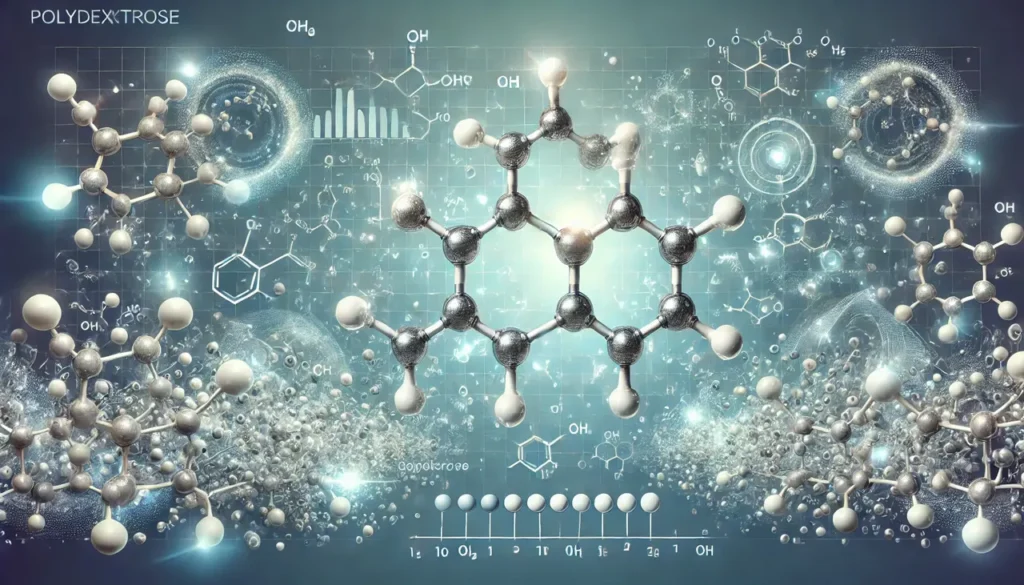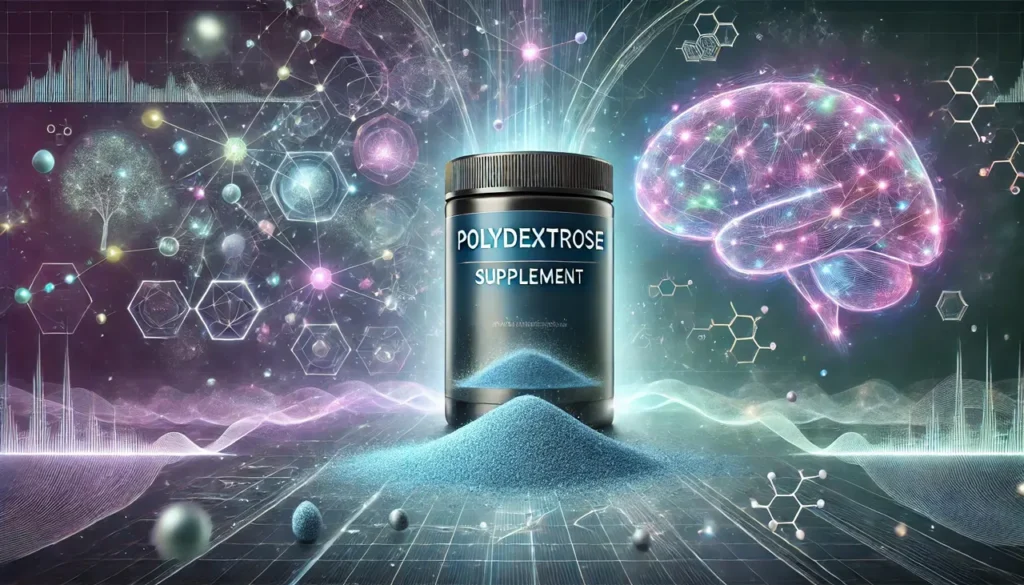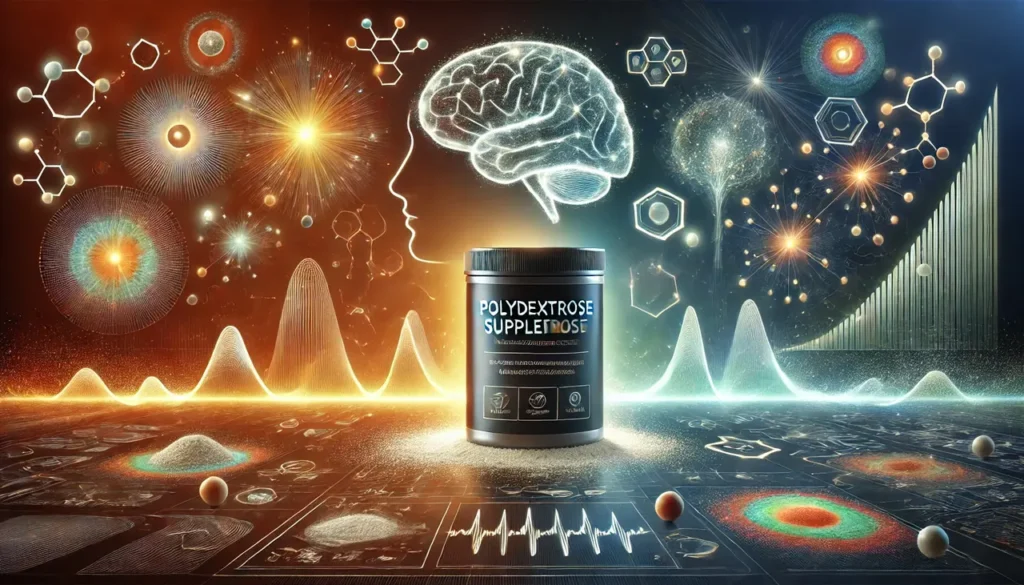Polydextrose is a synthetic polymer of glucose that is commonly used as a low-calorie bulking agent, sweetener, and dietary fiber in various food products. Emerging evidence suggests that polydextrose may possess nootropic properties, which could make it a valuable supplement for cognitive enhancement. This article delves into the chemistry, physiological mechanisms, potential nootropic benefits, appropriate dosages, side effects, interactions with other supplements and medications, and safety considerations associated with polydextrose.
You May Also Like:
Sources of Polydextrose
Polydextrose is primarily synthesized from glucose and sorbitol through a process called polymerization. The resulting product is a white, odorless powder that is soluble in water and has a low glycemic index. As a functional food ingredient, polydextrose is often found in various food products, including:
- Dietary Supplements: Polydextrose is included in many fiber supplements due to its soluble fiber content.
- Processed Foods: It is commonly used in low-calorie and sugar-free foods, such as candies, baked goods, and dairy products.
- Nutritional Bars and Drinks: Polydextrose serves as a bulking agent in meal replacement bars and shakes to improve texture and mouthfeel while reducing overall caloric content.
While dietary sources of polydextrose are limited, it is widely available in supplement form, making it accessible for those interested in exploring its potential cognitive benefits.
Strengthen Thinning Hair and Promote Growth for Healthy, Radiant Locks—Find Amazon’s Best Picks!

Chemistry of Polydextrose
Polydextrose is a randomly bonded polymer made up of approximately 90% dextrose and 10% sorbitol. It contains approximately 1.5 kilocalories per gram, significantly fewer than traditional carbohydrates. The unique chemical structure of polydextrose gives it its distinctive properties as a soluble fiber, allowing it to retain moisture and improve food texture while contributing to digestive health.
Polydextrose’s low-calorie content is attributed to its incomplete digestion in the gastrointestinal tract, where it acts as a bulking agent and may enhance the viscosity of the intestinal contents. This property can influence gastrointestinal motility and promote a feeling of fullness, which may indirectly support cognitive function by stabilizing blood glucose levels.

Physiological Mechanisms of Polydextrose in the Body and Brain
Polydextrose’s potential nootropic benefits may be attributed to several physiological mechanisms:
- Blood Sugar Regulation: Polydextrose has a low glycemic index, which means it has a minimal impact on blood sugar levels. This characteristic can help stabilize blood glucose, a critical factor for optimal brain function. Stable blood sugar levels are vital for maintaining focus, concentration, and cognitive performance, as fluctuations in glucose can lead to cognitive fatigue and impaired mental clarity.
- Gut Microbiota Modulation: As a soluble fiber, polydextrose acts as a prebiotic, promoting the growth of beneficial gut bacteria. A healthy gut microbiome has been linked to improved mood and cognitive function through the gut-brain axis. Short-chain fatty acids (SCFAs) produced during the fermentation of soluble fibers like polydextrose may influence brain health by reducing inflammation and enhancing neuroprotection.
- Satiety and Appetite Regulation: By increasing satiety and reducing appetite, polydextrose may indirectly enhance cognitive function. When individuals feel full and satisfied, they are less likely to experience distractions related to hunger, allowing for improved focus on cognitive tasks.
Maximize Your Mental Wellbeing with Amazon’s Top Stress Relief Supplements—Explore Now!

Nootropic Benefits of Polydextrose
The potential nootropic benefits of polydextrose stem from its ability to support cognitive function through various mechanisms. While research on polydextrose as a nootropic is still in its early stages, several potential benefits have been identified:
- Improved Cognitive Performance: By stabilizing blood glucose levels and providing a source of soluble fiber, polydextrose may enhance cognitive performance. A stable supply of glucose is essential for brain energy metabolism, which can lead to improved focus and concentration during demanding mental tasks. Furthermore, maintaining steady glucose levels helps prevent the cognitive dips associated with blood sugar fluctuations, enabling sustained attention and productivity. In this way, polydextrose may prove particularly beneficial for individuals engaged in high-stakes or cognitively demanding activities, such as students or professionals.
- Enhanced Mood and Mental Clarity: The modulation of gut microbiota through the prebiotic effects of polydextrose may contribute to improved mood and mental clarity. Emerging research suggests that the gut microbiome plays a crucial role in mental health, with certain bacteria producing neurotransmitters that can influence mood regulation and cognitive performance. Moreover, the production of short-chain fatty acids (SCFAs) from the fermentation of polydextrose in the gut has been linked to positive effects on mood and cognitive function, highlighting the significance of the gut-brain axis. Therefore, by promoting a healthier gut microbiome, polydextrose could serve as an adjunctive strategy for enhancing overall well-being.
- Reduced Cognitive Fatigue: Polydextrose’s ability to promote satiety and regulate appetite may also help reduce cognitive fatigue. When individuals are less distracted by hunger, they may experience better focus and performance during mentally challenging activities. This is particularly relevant in environments where sustained attention is critical, such as in academic or professional settings. Additionally, by reducing the frequency of snack breaks, which often lead to distractions, polydextrose could help individuals maintain a continuous workflow and ultimately improve productivity.
- Potential Neuroprotective Effects: Although more research is needed, polydextrose’s role in promoting a healthy gut microbiome may offer neuroprotective benefits. By reducing inflammation and supporting the production of SCFAs, polydextrose could help protect the brain from oxidative stress and inflammation, factors known to contribute to cognitive decline. Some studies indicate that a balanced gut microbiome may mitigate the risk of neurodegenerative diseases, suggesting that polydextrose may have a role in long-term cognitive health. Therefore, understanding its mechanisms could open new avenues for research into dietary strategies aimed at preserving cognitive function throughout aging.

Dosage and Supplementation Guidelines
There is currently no established recommended daily allowance (RDA) for polydextrose, but dosage guidelines for supplementation typically range from 4 to 20 grams per day, depending on individual needs and dietary considerations. For cognitive enhancement, individuals may consider starting at the lower end of this range and adjusting based on their responses.
- General Supplementation: For general health and cognitive support, a dosage of 4 to 10 grams of polydextrose per day may be effective. This amount can be easily incorporated into the diet through functional foods or as a standalone supplement.
- Higher Dosages for Specific Needs: Some individuals seeking to improve cognitive performance during periods of increased mental demand may choose to increase their dosage to 15 to 20 grams per day. It is advisable to do so gradually to monitor tolerance and potential gastrointestinal effects.
- Forms of Supplementation: Polydextrose is available in various forms, including powder, capsules, and bars. The powdered form can be easily mixed into smoothies, yogurt, or baked goods for convenient supplementation.
Transform Your Wellbeing with Amazon’s Best Multivitamins for Brain and Body Support—Find Out More!

Side Effects and Safety
Polydextrose is generally recognized as safe (GRAS) by the U.S. Food and Drug Administration (FDA) and is well tolerated by most individuals. However, some people may experience mild side effects, particularly at higher dosages:
- Gastrointestinal Distress: High doses of polydextrose can lead to gastrointestinal discomfort, including bloating, gas, diarrhea, or cramping. These effects are primarily due to the fermentation of soluble fiber in the gut, and they are more likely to occur in individuals who are not accustomed to high fiber intake.
- Hypoglycemia: Although polydextrose is designed to stabilize blood sugar levels, individuals with diabetes or those taking glucose-lowering medications should monitor their blood sugar closely when using this supplement. Polydextrose may contribute to lower blood sugar levels, which could lead to hypoglycemia if not managed properly.
- Allergic Reactions: While rare, some individuals may experience allergic reactions to polydextrose, resulting in skin rashes or other symptoms. Those with known sensitivities should consult a healthcare provider before using polydextrose supplements.
Interactions with Other Supplements and Medications
Polydextrose is generally considered safe for use with other supplements and medications. However, it is essential to be aware of potential interactions that may affect efficacy or safety:
- Blood Sugar Medications: Individuals taking medications for diabetes should exercise caution when using polydextrose. Its low glycemic index may further lower blood sugar levels, leading to potential hypoglycemic effects. Regular monitoring of blood sugar is recommended to prevent adverse effects.
- Fiber Supplements: Combining polydextrose with other fiber supplements may enhance the effects on gut health but could also increase the risk of gastrointestinal distress. Those considering this combination should gradually increase fiber intake and ensure adequate hydration.
- Nootropics: Polydextrose can be safely combined with other nootropic supplements, particularly those that enhance cognitive function and energy metabolism. However, individuals should start with lower doses to gauge their tolerance and response.
- Medications for Gastrointestinal Disorders: Individuals taking medications for gastrointestinal disorders, such as laxatives or antacids, should consult their healthcare provider before using polydextrose. While it is generally safe, its fiber content may interact with certain medications.
Risks for Individuals with Certain Health Conditions
While polydextrose is safe for most individuals, specific health conditions may require caution when using this supplement:
- Diabetes: Individuals with diabetes should consult a healthcare provider before starting polydextrose supplementation. Although it can help stabilize blood sugar levels, individual responses may vary, and close monitoring is necessary to avoid hypoglycemia.
- Irritable Bowel Syndrome (IBS): Individuals with IBS may experience exacerbation of symptoms when consuming high amounts of fiber, including polydextrose. It is advisable for those with IBS to start with low doses and monitor their tolerance.
- Gastrointestinal Disorders: Individuals with pre-existing gastrointestinal disorders should consult a healthcare provider before using polydextrose supplements, as increased fiber intake may worsen symptoms in some cases.
Support Healthy Sleep Patterns and Nighttime Recovery with Sleep Supplements—Order Today on Amazon!
Conclusion: Should You Consider Polydextrose as a Nootropic?
Polydextrose presents a promising avenue for enhancing cognitive function through its effects on blood sugar regulation, gut health, and appetite modulation. Its potential to improve cognitive performance, mood, and mental clarity makes it an intriguing candidate for nootropic supplementation. However, further research is needed to establish definitive claims regarding its cognitive-enhancing properties and long-term safety.
Before considering polydextrose as a nootropic supplement, individuals should consult with a healthcare professional, especially if they have underlying health conditions or are taking medications that may interact with the supplement. By following dosing guidelines and being aware of potential side effects and interactions, individuals can make informed decisions about incorporating polydextrose into their wellness regimen to support cognitive function and overall health.

References:
- Polydextrose – an overview. Retrieved from: https://www.sciencedirect.com/topics/agricultural-and-biological-sciences/polydextrose
- Polydextrose changes the gut microbiome and attenuates fasting triglyceride and cholesterol levels in Western diet fed mice. Retrieved from: https://www.nature.com/articles/s41598-017-05259-3
- Polydextrose: Physiological Function, and Effects on Health. Retrieved from: https://pmc.ncbi.nlm.nih.gov/articles/PMC5037538/
Important Note: The information contained in this article is for general informational purposes only, and should not be construed as health or medical advice, nor is it intended to diagnose, prevent, treat, or cure any disease or health condition. Before embarking on any diet, fitness regimen, or program of nutritional supplementation, it is advisable to consult your healthcare professional in order to determine its safety and probable efficacy in terms of your individual state of health.
Regarding Nutritional Supplements Or Other Non-Prescription Health Products: If any nutritional supplements or other non-prescription health products are mentioned in the foregoing article, any claims or statements made about them have not been evaluated by the U.S. Food and Drug Administration, and such nutritional supplements or other health products are not intended to diagnose, treat, cure, or prevent any disease.


